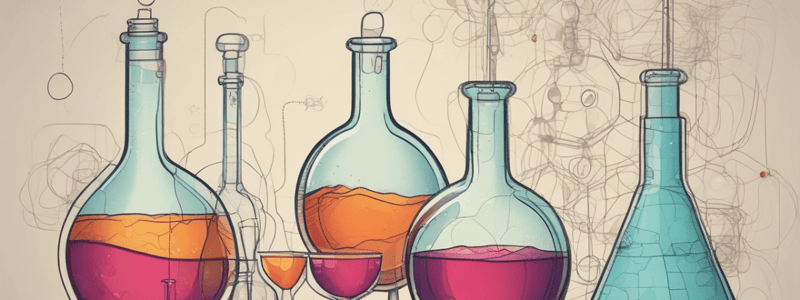Podcast
Questions and Answers
What is the result of treating alcohols with a strong acid?
What is the result of treating alcohols with a strong acid?
- The H is converted into a good leaving group
- The O is converted into a good leaving group (correct)
- The O is converted into a bad leaving group
- The OH is removed from the α and β carbon atoms
What type of reaction is dehydration?
What type of reaction is dehydration?
- An oxidation reaction
- A hydrolysis reaction
- An elimination reaction (correct)
- A substitution reaction
What is typically required for dehydration to occur?
What is typically required for dehydration to occur?
- A strong acid and a catalyst
- A strong acid and a base
- A weak acid and a base
- A strong acid (correct)
Which alcohols dehydrate more easily?
Which alcohols dehydrate more easily?
What is the mechanism by which 2° and 3° alcohols react?
What is the mechanism by which 2° and 3° alcohols react?
What is the rule that follows the regioselectivity of dehydration?
What is the rule that follows the regioselectivity of dehydration?
What is the product of dehydration when a mixture of constitutional isomers is possible?
What is the product of dehydration when a mixture of constitutional isomers is possible?
What is the role of the amine base in dehydration?
What is the role of the amine base in dehydration?
What is the primary factor in determining the alkene formed during dehydration?
What is the primary factor in determining the alkene formed during dehydration?
Why cannot 1° alcohols undergo dehydration by an E1 mechanism?
Why cannot 1° alcohols undergo dehydration by an E1 mechanism?
What is the role of POCl3 in the dehydration of alcohols?
What is the role of POCl3 in the dehydration of alcohols?
What is the advantage of using POCl3 and pyridine in dehydration reactions?
What is the advantage of using POCl3 and pyridine in dehydration reactions?
What is necessary for a substitution reaction to occur with an alcohol?
What is necessary for a substitution reaction to occur with an alcohol?
What is the result of reacting alcohols with HX (X = Cl, Br, I)?
What is the result of reacting alcohols with HX (X = Cl, Br, I)?
What is the mechanism of dehydration of 1° alcohols?
What is the mechanism of dehydration of 1° alcohols?
Why is Zaitsev's rule important in dehydration reactions?
Why is Zaitsev's rule important in dehydration reactions?
What is the typical order of reactivity of alcohols with HX?
What is the typical order of reactivity of alcohols with HX?
Why is ZnCl2 added to the reaction of 1o alcohols with HCl?
Why is ZnCl2 added to the reaction of 1o alcohols with HCl?
What is the role of SOCl2 in the conversion of alcohols to alkyl halides?
What is the role of SOCl2 in the conversion of alcohols to alkyl halides?
What is the purpose of adding a Lewis acid catalyst in the reaction of 1o alcohols with HCl?
What is the purpose of adding a Lewis acid catalyst in the reaction of 1o alcohols with HCl?
What is the trend in the reactivity of hydrogen halides?
What is the trend in the reactivity of hydrogen halides?
What is the role of PBr3 in the conversion of alcohols to alkyl halides?
What is the role of PBr3 in the conversion of alcohols to alkyl halides?
What type of reaction occurs when alcohols react with HX?
What type of reaction occurs when alcohols react with HX?
What is the stereochemistry of the products when the reaction occurs at a stereogenic center?
What is the stereochemistry of the products when the reaction occurs at a stereogenic center?
What is the purpose of SOCl2 and PBr3 in the conversion of alcohols to alkyl halides?
What is the purpose of SOCl2 and PBr3 in the conversion of alcohols to alkyl halides?
Why do more substituted alcohols react more rapidly with HX?
Why do more substituted alcohols react more rapidly with HX?
What is the primary function of ZnCl2 in the reaction of 1o alcohols with HCl?
What is the primary function of ZnCl2 in the reaction of 1o alcohols with HCl?
Why do PBr3 and SOCl2 convert alcohols into alkyl halides?
Why do PBr3 and SOCl2 convert alcohols into alkyl halides?
What is the relationship between the acidity of hydrogen halides and their reactivity?
What is the relationship between the acidity of hydrogen halides and their reactivity?
What determines the stereochemistry of the products when the reaction occurs at a stereogenic center?
What determines the stereochemistry of the products when the reaction occurs at a stereogenic center?
What is the role of the R group in the reaction of alcohols with HX?
What is the role of the R group in the reaction of alcohols with HX?
Why is Cl¯ a poorer nucleophile than Br¯ or I¯?
Why is Cl¯ a poorer nucleophile than Br¯ or I¯?
What is the difference between the reaction of 1o alcohols with HCl and 2o or 3o alcohols with HX?
What is the difference between the reaction of 1o alcohols with HCl and 2o or 3o alcohols with HX?
What is the function of the Lewis acid catalyst in the reaction of 1o alcohols with HCl?
What is the function of the Lewis acid catalyst in the reaction of 1o alcohols with HCl?
Why do more substituted alcohols react more rapidly with HX?
Why do more substituted alcohols react more rapidly with HX?
What is the purpose of using thionyl chloride and phosphorus tribromide in the conversion of alcohols to alkyl halides?
What is the purpose of using thionyl chloride and phosphorus tribromide in the conversion of alcohols to alkyl halides?
More substituted alcohols react less rapidly with HX
More substituted alcohols react less rapidly with HX
The reaction of 1o alcohols with HCl occurs without an additional Lewis acid catalyst
The reaction of 1o alcohols with HCl occurs without an additional Lewis acid catalyst
SOCl2 converts alcohols into alkyl bromides
SOCl2 converts alcohols into alkyl bromides
The acidity of hydrogen halides decreases with increasing reactivity
The acidity of hydrogen halides decreases with increasing reactivity
Complexation of ZnCl2 with the O atom of the alcohol makes a poor leaving group
Complexation of ZnCl2 with the O atom of the alcohol makes a poor leaving group



